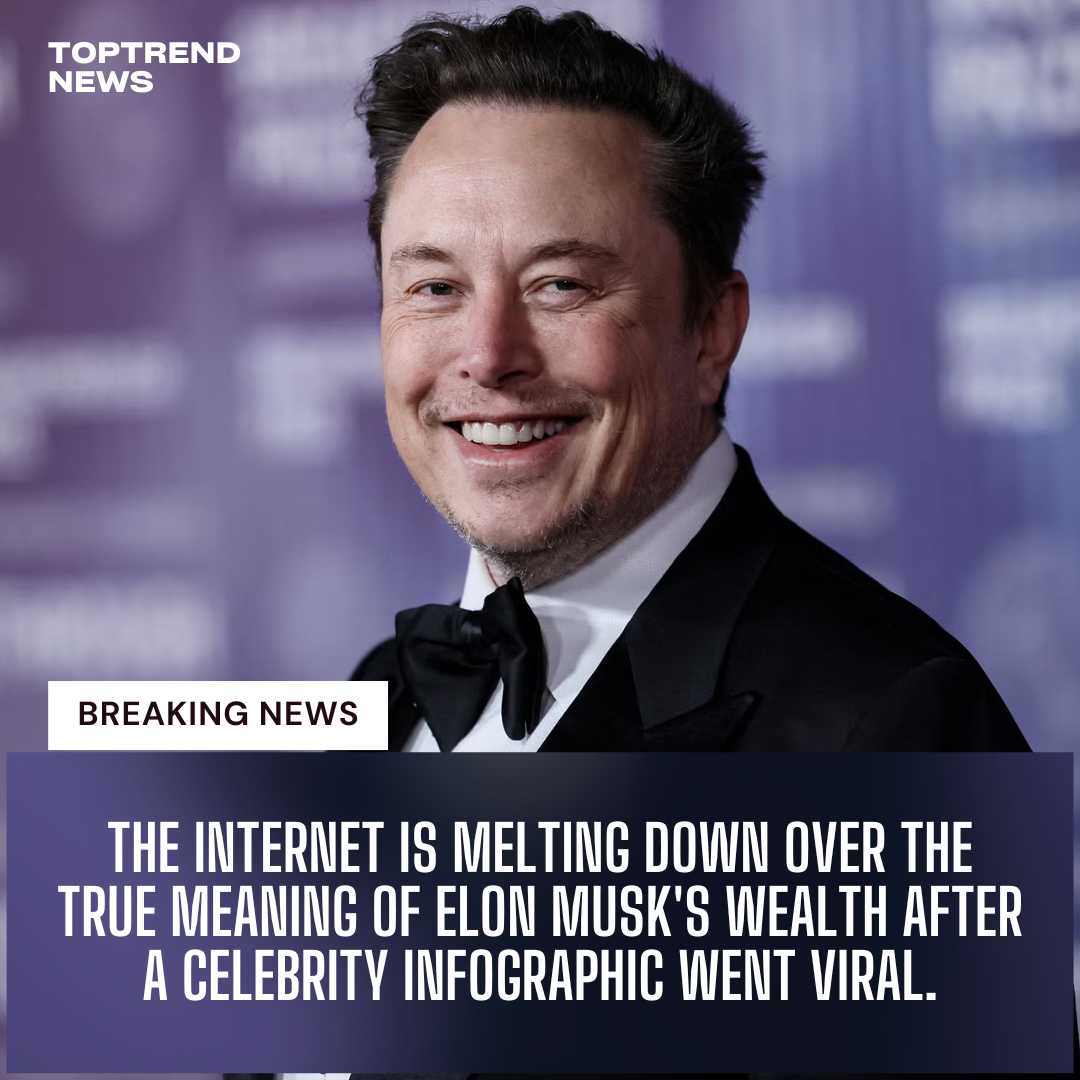In the current epoch of social media-driven discourse, few figures command global attention quite like Elon Musk. His pronouncements, corporate maneuvers, and personal life routinely become the epicenter of viral storms. However, the latest explosion of debate wasn’t triggered by a new rocket launch or a revolutionary vehicle, but by a simple, glossy infographic shared by pop icon Billie Eilish.
The post, which rapidly spread across X (formerly Twitter) and TikTok, contained a compelling, yet fundamentally flawed, proposition: that Musk’s colossal net worth, estimated in the hundreds of billions, was more than sufficient to “end world hunger,” “deliver global clean water,” or even “rebuild Gaza.” It presented a moral ultimatum, questioning why a person of such unparalleled financial might would not simply write a check to solve humanity’s most intractable problems.
What followed was not just a typical celebrity clash, but a ferocious and deeply necessary public education on the nature of modern wealth. The ensuing meltdown—a storm of outrage, economic rebuttals, and political finger-pointing—served as a potent reminder that a billionaire’s wealth is often a billion-dollar illusion, existing primarily in the form of potential, not immediately spendable cash.
The Infographic Hook: The Simplification of Catastrophe
The core of the viral graphic’s appeal lay in its deceptive simplicity. It reduced complex global issues—poverty, logistics, infrastructure, and geopolitical disputes—to a straightforward math problem: Problem X requires Y dollars; Elon Musk has Z dollars; therefore, Z > Y, and the problem should be solved. This narrative, easy to digest and emotionally resonant, tapped into a deep, understandable public frustration over vast global inequality.
The sheer scale of Musk’s net worth—tied mostly to his ownership stakes in visionary, high-valuation companies like Tesla and SpaceX—makes it the perfect symbol for such critiques. It positions the billionaire not as a successful entrepreneur but as a moral scapegoat, implying that their refusal to liquidate and donate everything is an act of selfishness causing widespread human suffering.
However, as prominent economists and users with a sophisticated understanding of markets quickly pointed out, the premise relies on a basic misunderstanding of financial markets: a crucial economic lesson that often gets lost in the noise of social media activism.
The Rebuttal: Wealth is Not a Warehouse of Cash
A counter-post, which gained equal if not greater viral traction, quickly became the central rebuttal to the celebrity-driven economic narrative. This counter-argument articulated a fundamental truth: Elon Musk’s net worth is not a mountain of physical currency or a vault stocked with gold.
Instead, his wealth is overwhelmingly derived from shares in Tesla, SpaceX, and X. These are digital entries on a ledger, reflecting the public and private markets’ valuation of those companies. They represent potential value, not liquidity. For Musk to “spend” tens or hundreds of billions of dollars, he would have to sell a significant portion of his stock.
This action triggers the central economic dilemma, known as the ‘Liquidity Problem’ and the ‘Market Distortion Effect.’
1. The Liquidity Problem: If Musk attempted to sell, say, $50 billion worth of Tesla stock overnight, the massive influx of supply would inevitably crash the stock price. This immediate, drastic dip in value would effectively reduce the remaining value of his holdings and the holdings of every other investor (including retirement funds, pension schemes, and ordinary shareholders) simultaneously. The intended capital—$50 billion—would likely only yield a fraction of that amount before the market reacted, and the total wealth of the companies he relies on to innovate would be severely damaged.
2. The Distortion Effect: Even if the money were readily available, converting hundreds of billions of dollars into real, physical resources—food, water infrastructure, construction materials for rebuilding Gaza—would create unprecedented market distortion. As one viral post succinctly explained, if Musk suddenly tried to purchase “700 billion pounds of food,” the world would not magically produce more food instantly. Instead, demand would surge against fixed supply, causing the global price of food to skyrocket. Ordinary families and existing aid agencies would suddenly be competing with a trillion-dollar buyer, making basic sustenance unaffordable for millions who were already struggling. In essence, trying to alleviate one crisis through sudden, massive expenditure could create a cascade of new crises elsewhere.
Opportunity Cost and The Real-World Logistical Maze
The debate further highlighted the concept of “opportunity cost.” Real resources—engineers, construction workers, trucks, steel, wheat fields—are finite. Pouring billions into one sector requires those resources to be pulled away from other activities, such as manufacturing, public works, or critical health services. Solving world hunger isn’t just a financial transaction; it is a monumental logistical challenge involving infrastructure, political stability, distribution networks, and coordinated labor.
In the context of the Middle East, for instance, political gridlock and long-term conflict, not a lack of liquid capital, are the primary obstacles to sustained rebuilding and aid distribution. No single check, however large, can resolve corruption, establish peace, or mandate the construction of new ports and roads. It requires thousands of coordinated workers, political solutions, and the willingness of various governments—challenges that exist far beyond the scope of a billionaire’s chequebook.
The Broader Brand: From Trophies to Technical Deth-Defiance
The controversy coincided with several other viral elements shaping the public’s perception of the entrepreneur, further complicating the narrative. While Eilish’s post framed him as financially heartless, other stories revealed the intense personal and professional pressures he faces.
His ex-wife, Justine Wilson, recently opened up about the emotional struggles of their marriage, detailing the “immense pressure” she felt to adopt a specific image, describing a life of relentless performance where his professional mindset blurred into their intimate life. She spoke candidly about feeling like a “trophy wife,” a role she “sucked at,” revealing the personal toll of life under constant scrutiny. This narrative, while entirely separate from his corporate empire, added a human, if complicated, dimension to the public persona being attacked.
Simultaneously, Musk was again setting the internet ablaze by amplifying the capabilities of his AI chatbot, Grok, and his general approach to technology. Grok, designed to have an “unhinged” or irreverent mode, has itself become a source of viral content, both amusing and controversial. Musk’s call for users to leverage Grok for “vulgar roasts” at parties or his team’s race to fix its occasional misfires (including one that revived a long-debunked and offensive claim) only reinforced the public’s view of him as both a visionary and a cultural provocateur.
The public also learned of Musk’s plans to pen his own autobiography, following the massive success of Walter Isaacson’s authorized biography. Musk stated he needed to “tell my story myself and highlight lessons that I learned along the way.” This move suggests a conscious effort to reclaim his narrative and shift the spotlight from the external critiques (like Eilish’s) back to his legacy of innovation—a legacy that he and his supporters argue is his greatest form of societal contribution. After all, the value represented by his shares is the capital enabling the existence of Tesla (accelerating sustainable energy) and SpaceX (making humanity multi-planetary, arguably preventing a single-planet catastrophic end, or deth, scenario).
The Evasion of Responsibility?
Critics, however, counter the economic arguments by pointing out that while he may not be able to solve every issue with one check, the sheer volume of his resources implies a moral obligation to engage far more aggressively in philanthropy and social solutions than he currently does.
They argue that even if liquidation is problematic, his ability to direct capital, talent, and technological resources—the same resources that launched rockets and built electric kll-er vehicles—towards issues like clean water or disease prevention is unmatched. To use the complexity of the economy as an excuse for inaction, they claim, is an evasion of responsibility.
The debate ultimately transcends Elon Musk and Billie Eilish; it is about the structural legitimacy of modern hyper-wealth. The viral clash highlighted the deep chasm between how the public perceives a billionaire’s financial capacity (as an unlimited pool of cash) and the reality of how stock markets and global supply chains actually function.
In the end, while Musk is unlikely to write a single check to ‘fix’ the world, the viral explosion forced a critical conversation. It proved that sometimes, the most important contribution a controversial figure makes is not their money, but their role as a catalyst for a global, overdue discussion about economics, ethics, and the responsibility that comes with being an icon in the trillion-dollar age.

